Semrush is for many the best option to improve SEO and rank higher in SERPs. However, as a cheaper alternative, some prefer to use SpyFu. If you’ve never used any of them, you might be wondering what is a better choice – SpyFu or Semrush. Our guide will address this question and answer it comprehensively. Our Semrush vs SpyFu duel consists of several tests that will examine all of their features and functions. Semrush is an excellent all-around option and SpyFu is more inclined to competitive analysis.
These services share a good number of features but you’ll find many of them missing in SpyFu. Generally speaking, Semrush is a better option than SpyFu, which deserves our recommendation. Still, this doesn’t mean you should instantly get it.
Depending on your needs, one might suit you better than the other. That’s why we recommend staying with us. In this Semrush vs SpyFu comparison for 2024, you’ll find out exactly how these two compare, subsequently, allowing yourself to make a wiser choice.
SpyFu vs Semrush: Our Quick Conclusion
Our quick conclusion is that Semrush wins against SpyFu. If you’re in a rush or too lazy to read the entire thing, let us list the reasons for using both services.
Semrush is best for :
- Domain & keyword research
- Site audits
- Backlink analytics and link building
- Search Intent metric
- Keyword Magic Tool
- PPC research
SpyFu is best for :
- Ease of use and intuitiveness
- Unlimited reports
- Very affordable price (from $16 a month)
- Free plan
Semrush vs SpyFu Features Comparison
There’s no better way of starting this SpyFu vs Semrush comparison than talking about the features of both tools.
We’ll go through the most vital ones and compare them side by side. Below, you also see who is the winner in each category.
Domain Research (Semrush Wins)
This category is a mandatory win for Semrush and we’ll explain why.
Namely, as popular SEO tools, both of them allow for comprehensive domain research. This functions by typing in the domain address and receiving a boatload of information about it.
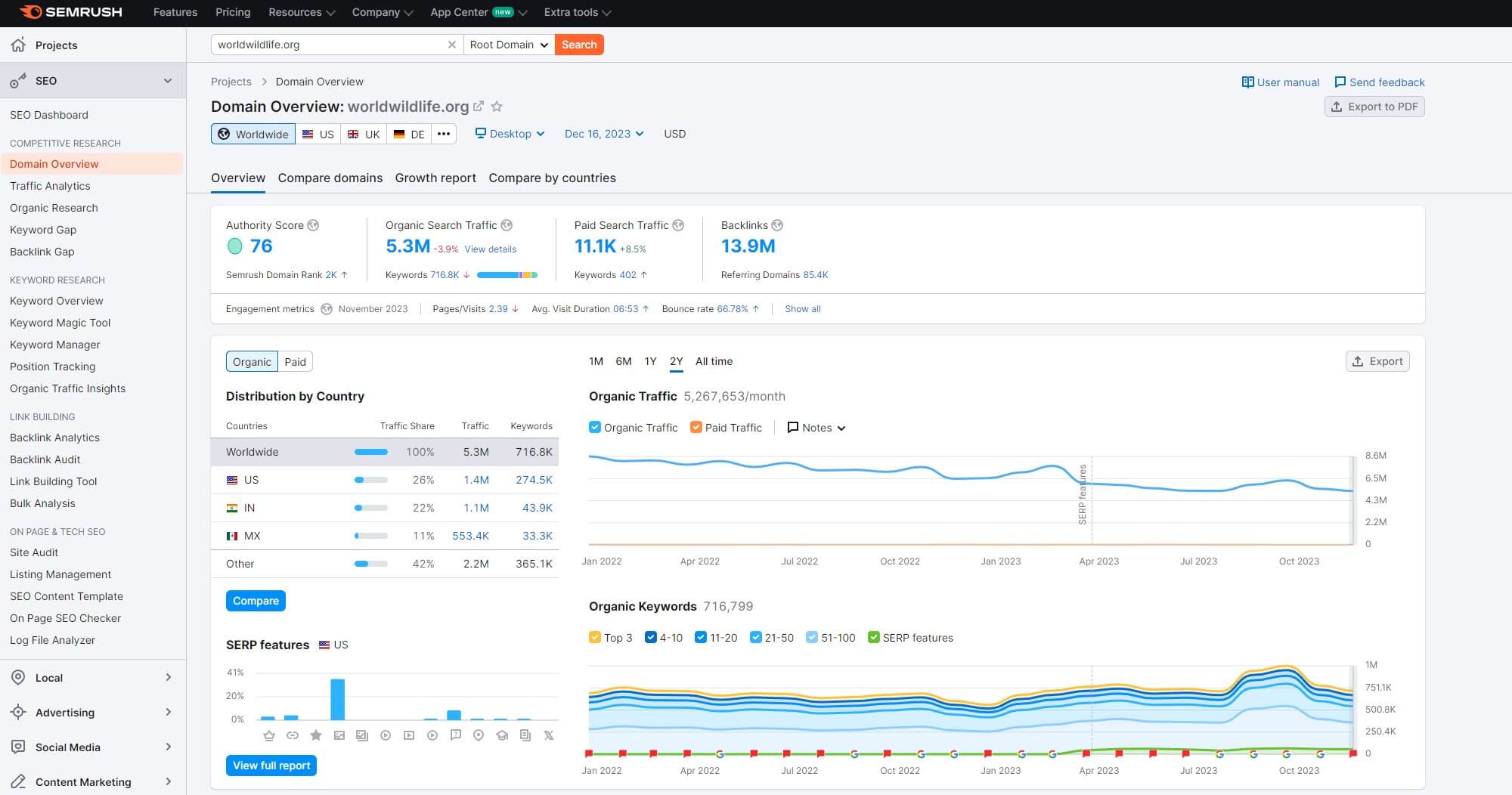
Semrush is known for its in-depth reports that consist of things like organic/paid traffic, the number of backlinks, traffic distribution, SERP features, and so much more. In particular, we like that it displays the authority score of a domain, ranging from 0 to 100.
The higher the authority score, the more the domain is “authoritative” in a specific niche. This can be improved by writing quality content about this niche, thereby, gaining authority over it. Generally, Semrush will display how well your and your competitor’s sites perform.
Key Differences Between Semrush and SpyFu
SpyFu’s ability to thoroughly research domains is undeniable. However, pair SpyFu with Semrush and it swiftly becomes obsolete. The key difference lies in many metrics, such as the aforementioned authority score. SpyFu doesn’t display it and it’s a huge miss.
Moz and Ahrefs give you their version of authority scores – for us, a vital metric in many cases. Moving on, Semrush’s search intent is extremely useful, as it helps you discover the intent behind users’ search for a specific keyword.
It can be commercial, transactional, navigational, or informational. Again, SpyFu’s equivalent is non-existent. We found search intent particularly helpful in many cases, and surprisingly, apart from SE Ranking, not many SEO tools offer this bit of information.
Traffic Research
We should talk about traffic research as well in this Semrush vs SpyFu duel. Both services can perform this operation but again, Semrush is more insightful than SpyFu. It’s good to know that we’re talking about estimates here, especially for smaller sites.
However, we love that Semrush is “honest” by showing you how precise its estimation is. For smaller domains, expect a larger margin of error. Semrush will tell you how accurate it is from one to three horizontal lines, where the latter indicates the highest accuracy.
Surprisingly, SpyFu will estimate the traffic number but won’t tell you how accurate it is. We’re quite irritated by the lack of global traffic information in SpyFu. Instead, you need to select a specific country – ALWAYS – and then perform the analysis.
To make it clear, you can’t choose to see your traffic on a global level unlike in Semrush. SpyFu’s rival always shows you your global metrics, whether we’re discussing traffic analytics or tracking rankings. Such a handy addition.
Supported Countries
When discussing supported countries, you’d expect SpyFu to be more generous. Well, it’s not. With around 15 countries, you’re quite limited in your ability to get information. Semrush, on the other hand, has more than 120 countries to pick from.
This allows you to track the website and better its SEO even in less popular countries. In other words, SpyFu is immediately out of play if you’re not targeting the major European, American, or Asian countries. That said, it’s obvious that Semrush trumps SpyFu.
Analyze Your Domain With Semrush
Keyword Research (Semrush Wins)
Keyword Research isn’t SpyFu’s magnum opus feature. Yet, much like Semrush, it’s easy to use it to find various information related to keywords. These include the volume, difficulty, keyword suggestions, and so forth.
SpyFu and Semrush operate in the same way. You need to provide the keyword you want to analyze and all relevant information will appear. SpyFu and Semrush use a difficulty score from 0 to 100, where a higher score means it’ll be more difficult to rank for a keyword.
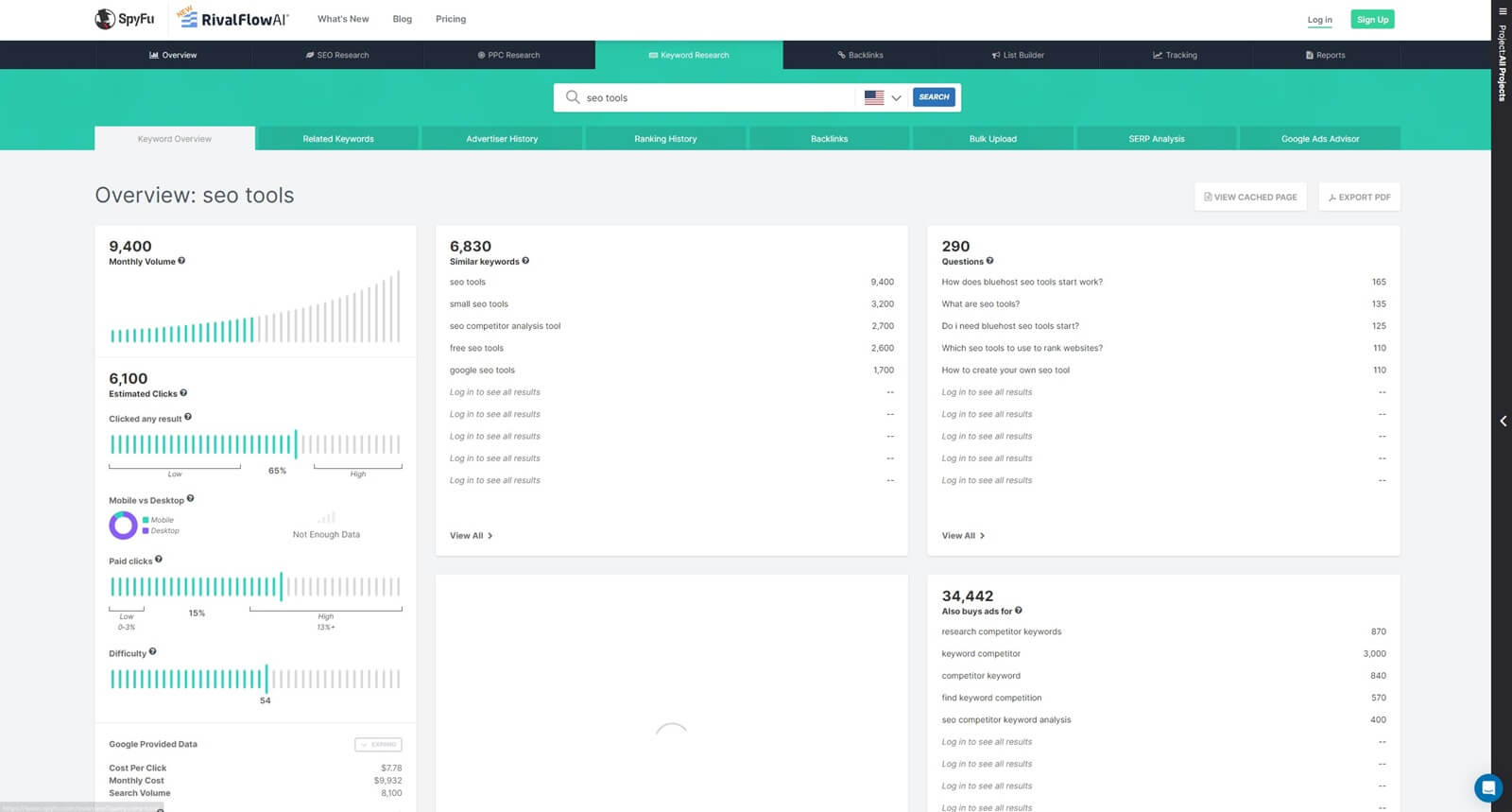
SpyFu is a bit vague, showing only the score and nothing more. Semrush shows you the number of backlinks you’ll need to rank in the top ten SERPs. However, for extremely difficult keywords, Semrush tends to be vague from time to time.
For example, instead of saying “You need that many backlinks”, you can get an answer like “You need a lot of on-page SEO, blah, blah…” Still, these situations are very rare and most of the time, Semrush will be precise.
Difficulty Score Discrepancy
In our SpyFu vs Semrush comparison, we noticed one discrepancy – a big one. Namely, when comparing keyword difficulty scores, Semrush always displayed a higher difficulty for the same keyword. Use the keyword “SEO” as an example.
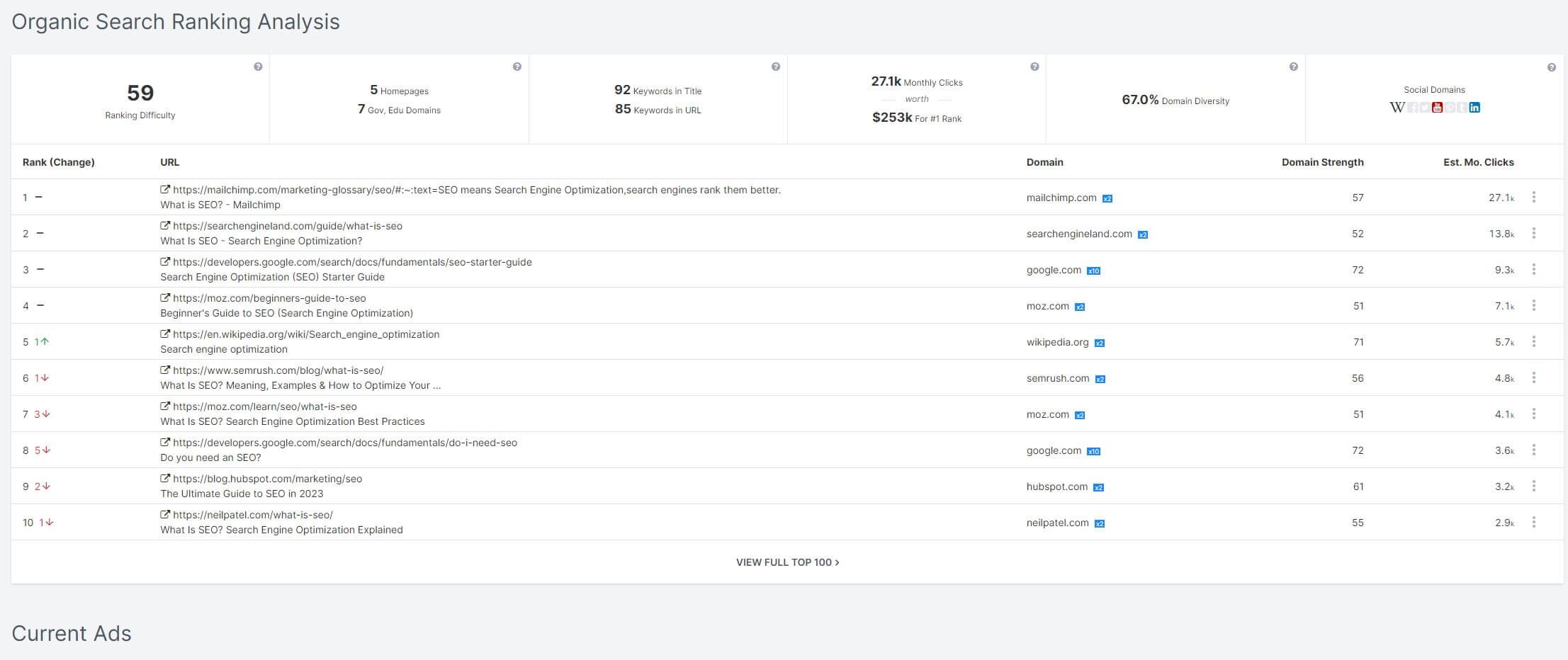
In SpyFu, the difficulty is 59, while in Semrush, it’s 86. Obviously, the keyword “SEO” sounds pretty difficult and we find it hard to believe the score is 59.
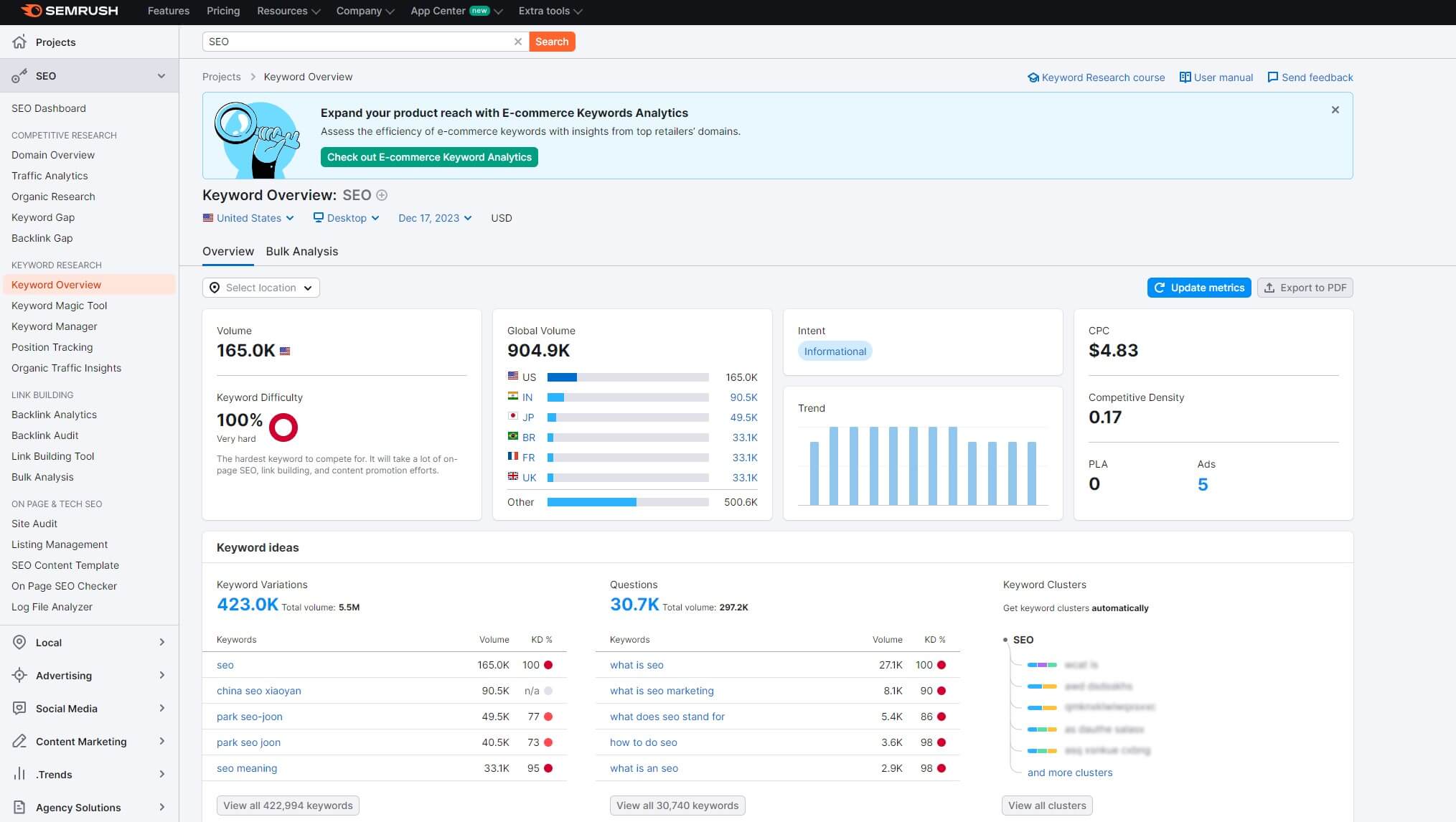
However, in Ahrefs, it’s 90 – much closer to Semrush. Ahrefs is frequently used as a benchmark for this metric because of its incredible accuracy.
Therefore, it looks like SpyFu is way off. In fact, we despise this, as it’ll give you false hope that you can rank for the keyword relatively easily when in reality, it’s extremely difficult.
This is because SpyFu calculates the score only by using backlinks that point to the sites that rank higher for a specific keyword. In contrast, Semrush uses backlinks, word count of the keyword, volume, and a few other factors, hence the higher difficulty.
Keyword Suggestions
When it comes to keyword suggestions, Semrush and Ahrefs are often the best options. In particular, we love Semrush’s Keyword Magic Tool which works incredibly well. After searching for the keyword, it’ll come back to you with a huge amount of data.
Metrics like difficulty, global volume, CPC, trend, and many more will appear. Semrush allows you to get keyword suggestions in the form of a broad match, a phrase match, or an exact match. We like the option to see questions related to the keyword.
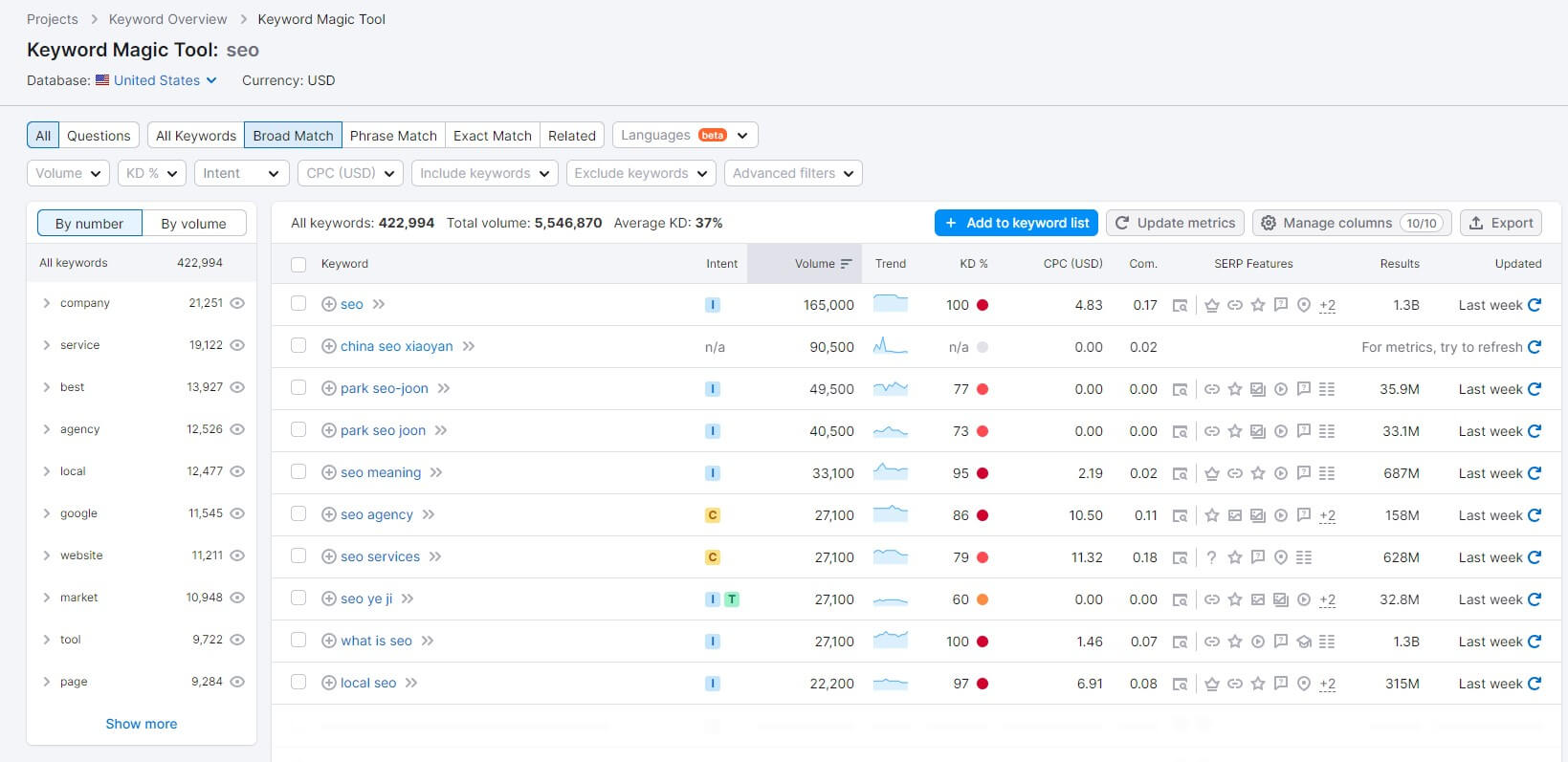
Mind you, all of these suggestions are displayed with the parameters we just mentioned. The Keyword Magic Tool lets you pick from a multitude of languages, albeit, since it’s currently in the Beta phase, you have around 10+. More than enough for now.
SpyFu has nothing akin to this tool but either way, it brings up keyword suggestions with every keyword analysis. You’ll see similar keywords, questions, and the keywords that the top-ranking domains rank for, which is a neat addition.
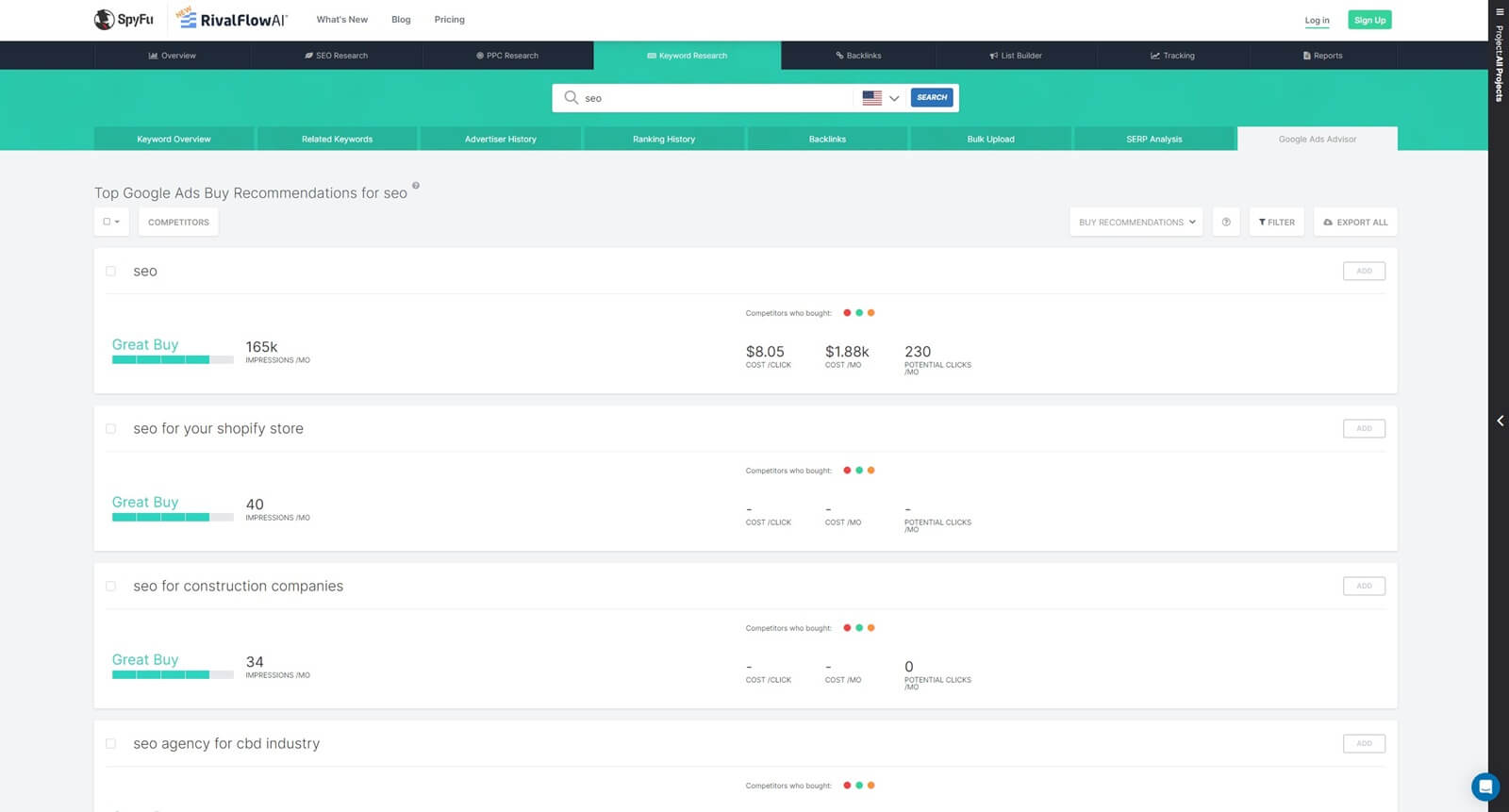
SpyFu also includes the list of keywords that the top advertisers buy for their PPC campaigns. In addition, SpyFu divulges the top Google Ads recommendations for the keyword, with the number of impressions per month, along with the names of competitors who bought them.
Surprisingly, SpyFu’s keyword suggestions are excellent but still not better than Semrush which comes back with more suggestions given its almost four-times-larger database. We want to mention that Semrush also allows you to see more parameters.
For example, the search intent isn’t available in SpyFu. In total, SpyFu focuses primarily on difficulty, CPC, and volume, while Semush focuses on all three with the addition of SERP features, tried, the number of SERPs for the keyword, and so on.
Get Keyword Suggestions From Semrush
Keyword Clustering
Keyword Clustering is a feature offered by Semrush and Spyfu.
However, in this Semrush vs SpyFu duel, the former is superior. Namely, there’s the Keyword Manager Tool. It allows you to craft lists of keywords and track their vital parameters, many of which we mentioned so far.
Logically, keyword clustering is available and lets you boost your topical authority over a specific niche you’re working on. Based on the keyword in place, the service will display a mind map that shows logical suggestions and questions related to it.
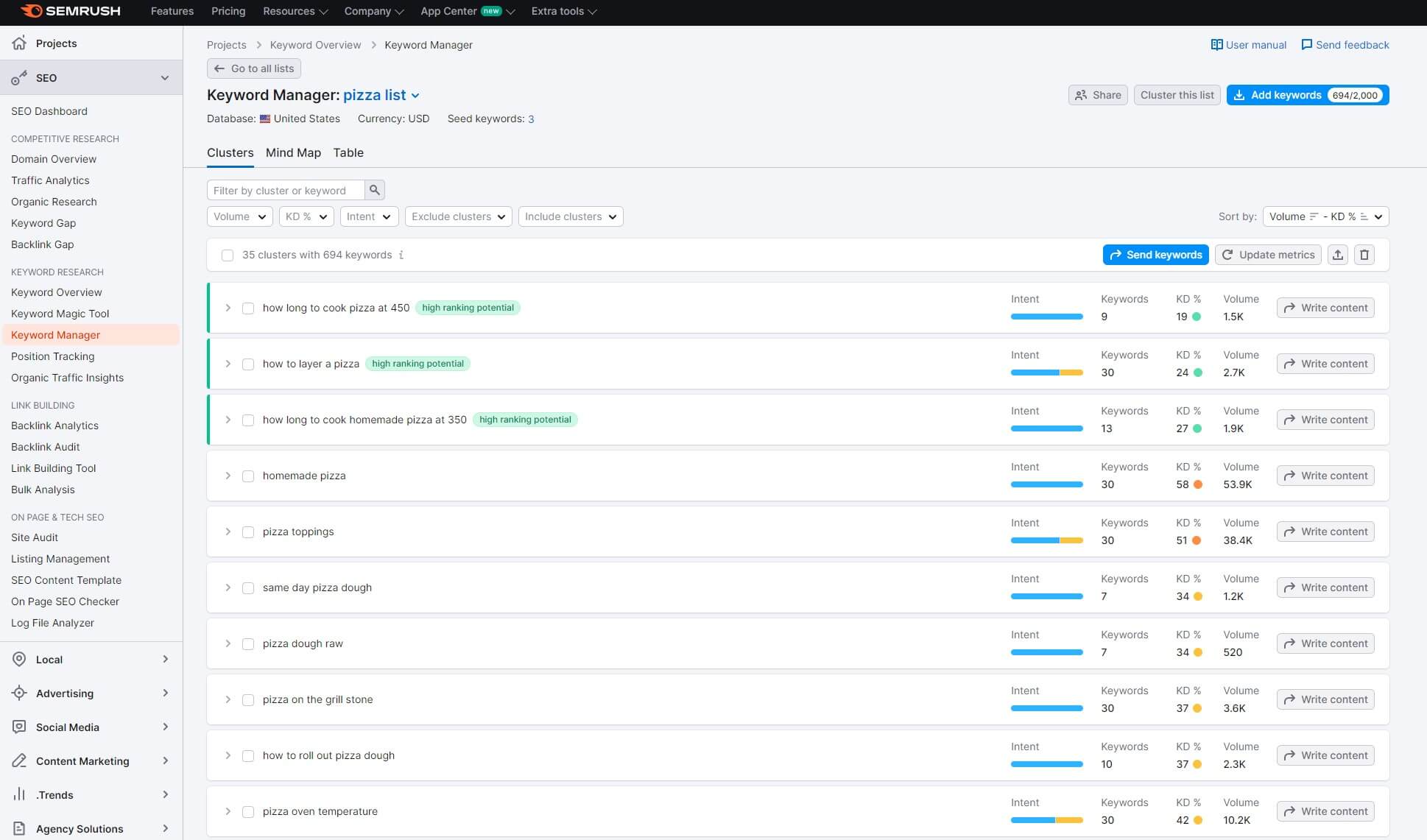
Compared to Ahrefs, it’s a bit off, as some suggestions are… well, OFF. However, it’s a good replacement for SpyFu because the process in this tool is tedious. Its Keyword Universe tool lets you do something similar, displaying the suggested keywords based on your domain.
Users can create keyword groups but not get a difficulty score for them, which is pointless. Compared to SpyFu, Semrush’s mind map suggestions are followed by all crucial parameters so that you can see how difficult it is to rank for a specific search query.
PPC Analysis
In terms of PPC Analysis, both services are more than excellent. With Semrush, it’s easy to access this tool by going to Advertising and then choosing Advertising Research. From here, you can find a heap of information about the domain in question.
Most notably, the tool allows you to research third-party ad services and not only Google – Amazon, for example. SpyFu focuses only on Google Ads but compared to Semrush, it actually offers a bit more. Besides, this is one of SpyFu’s specialties.
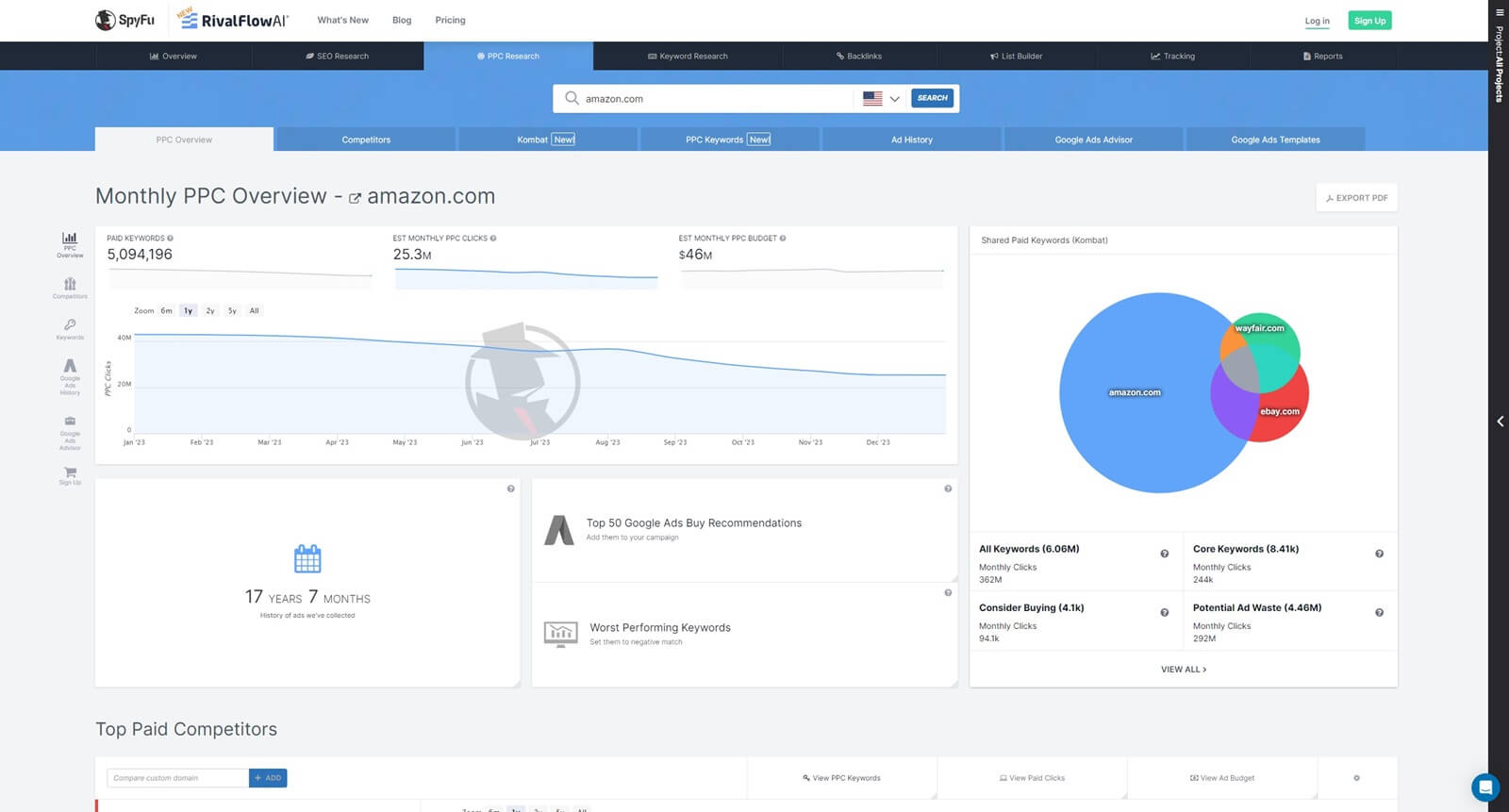
You’ll find data about the number of keywords used by the domain, estimated monthly PPC clicks and PPC budget, the most successful keywords, and so on. Another excellent addition is the Google Ads Advisor, which gives you plenty of PPC keywords that you can aim for.
For those who want to create PPC campaigns swiftly, SpyFu includes Google Ads Templates. With it, you can create an ad campaign template in minutes based on the keywords and import it to your domain for further use.
If you visit its Ad History tab, SpyFu offers the option to fetch up to 18 years of historical data. Semrush, for example, offers the option to go 12 years back. We like SpyFu’s Kombat feature, which displays shared keywords between the rival domains.
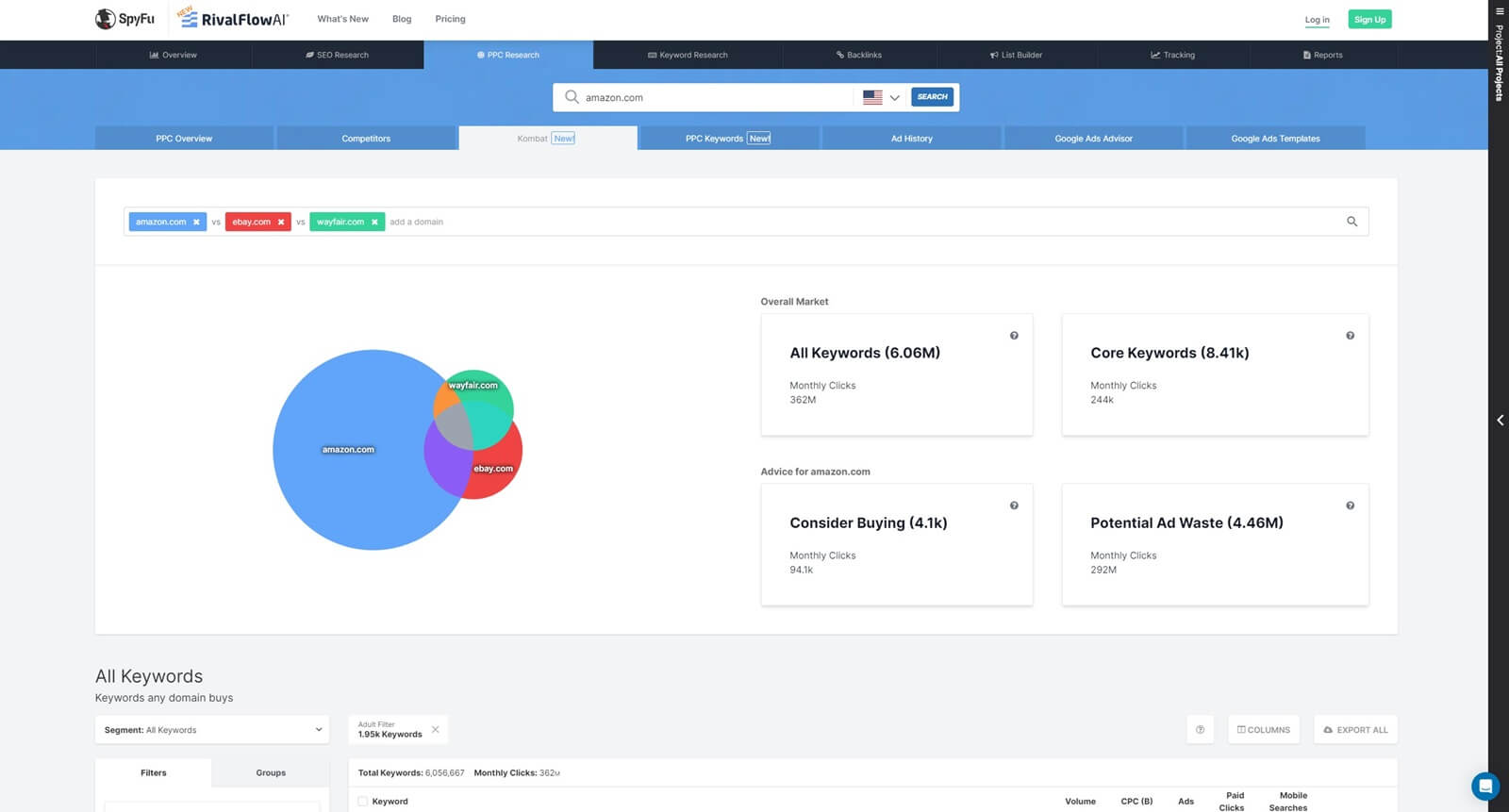
This effectively lets you discover your competitors for the keyword and target them to rank higher. The PPC Keywords tab lets you find paid keywords on competitors’ sites or your site based on a whole lot of parameters, such as volume, CPC, mobile searches, difficulty, organic clicks, and many more.
So, which is better in PPC analysis, SpyFu or Semrush? We’d say SpyFu has an edge because it’s cheaper, yet, offers a lot more data regarding PPC. Semrush offers more than Google Ads-related research but mainly through third-party apps that you’ll pay for on top.
Rank Tracking
Tracking rankings in SpyFu and Semrush is intuitive and easy. Once the keyword is provided, you can track its ranking and be notified of its changes. Both services update their ranking information daily, unlike Ahrefs which does that weekly.
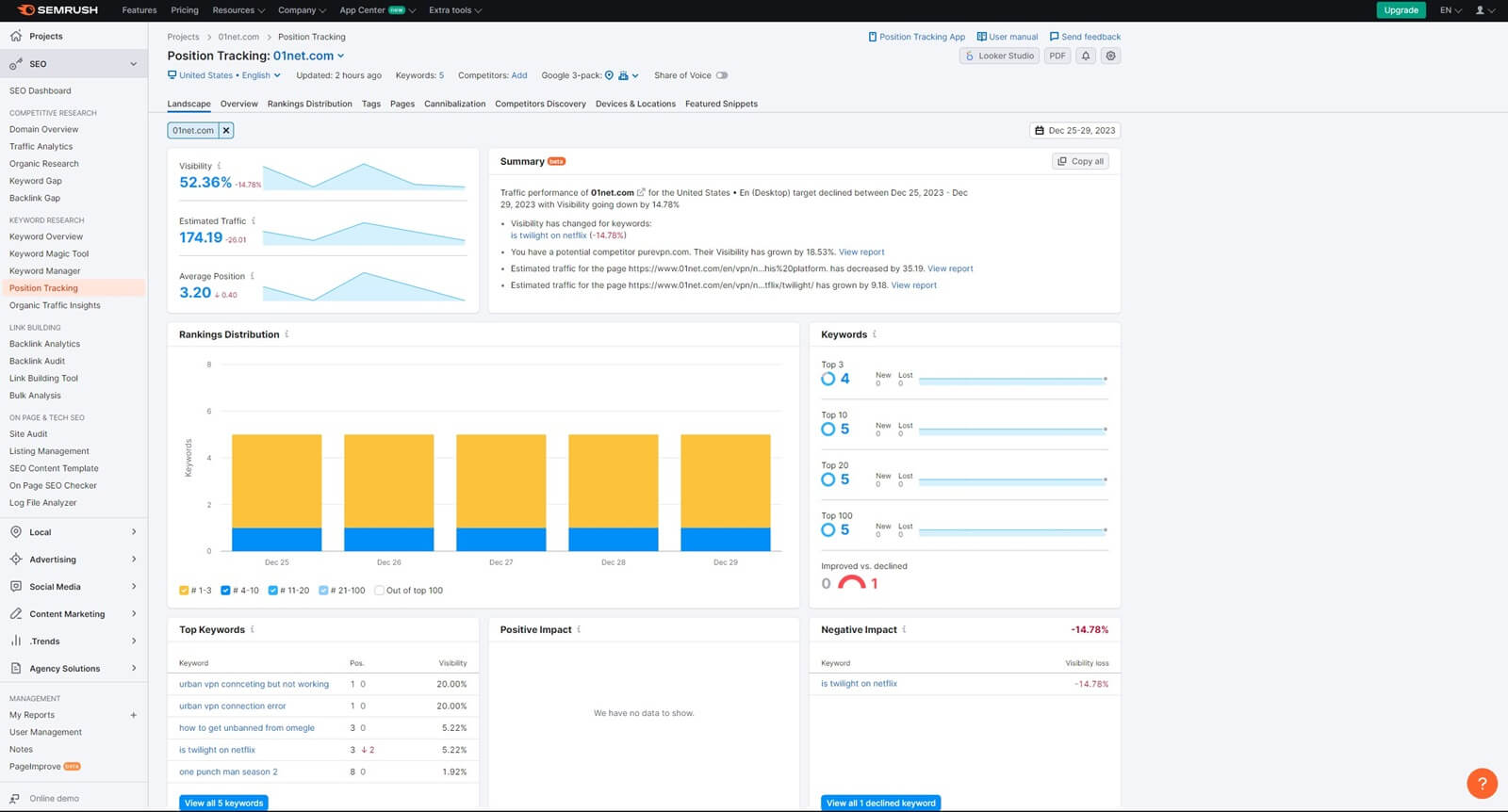
Semrush’s Pro plan – the cheapest one – tracks 500 words, while SpyFu’s Basic plan tracks 5,000 keywords. Indeed, the latter is more generous and tracks more keywords for a lesser price.
However, SpyFu does provide a marginally smaller set of information than Semrush.
Supported Search Engines
Supported search engines of Semrush and SpyFu aren’t exactly numerous. While Ahrefs supports 9 of them, Semrush and SpyFu only support 1 and 2 respectively. As expected, the first tool fetches its information from Google.
SpyFu does the same but it includes Bing. However, we noticed that Bing-related info tends to be less accurate. On more than a few occasions, we saw messages like “Sorry, we don’t have enough data to make recommendations.”
Link Building and Backlink Analysis (Semrush Wins)
Interested in how good your backlink profile is? Well, a proper backlink analysis tool will do the job. As expected, both tools have something to offer but again, Semrush is superior. First of all, Semrush’s database is gargantuan compared to SpyFu.
With more than 805 million domains, the tool trumps its rival which has “only” around 130 billion. In practice, this equates to Semrush showing WAY more referring domains than its rival, which we were quick to confirm in our test.
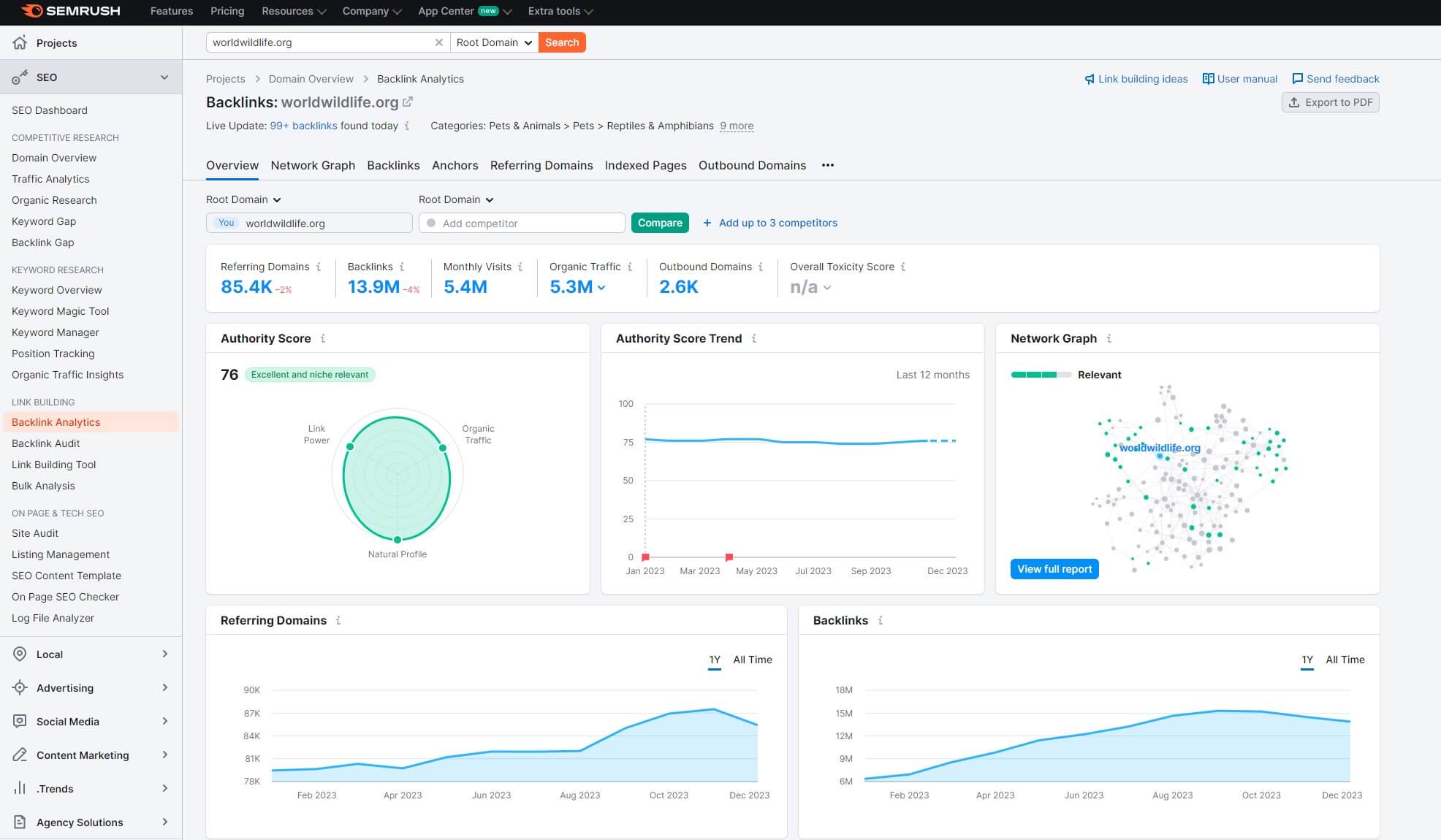
Comparing their backlink analytics side by side, we can see Semrush solidifying its superiority. Its reports are super-detailed, with beautiful graphs showing the domain authority score, organic traffic, monthly visits, referring domains, backlinks, etc.
We like the option to open to see indexed pages of a domain, with outbound domains and anchors used by websites that have a backlink to a site in question. If you look at SpyFu’s backlink analytics, you’ll be fairly disappointed. That’s an understatement.
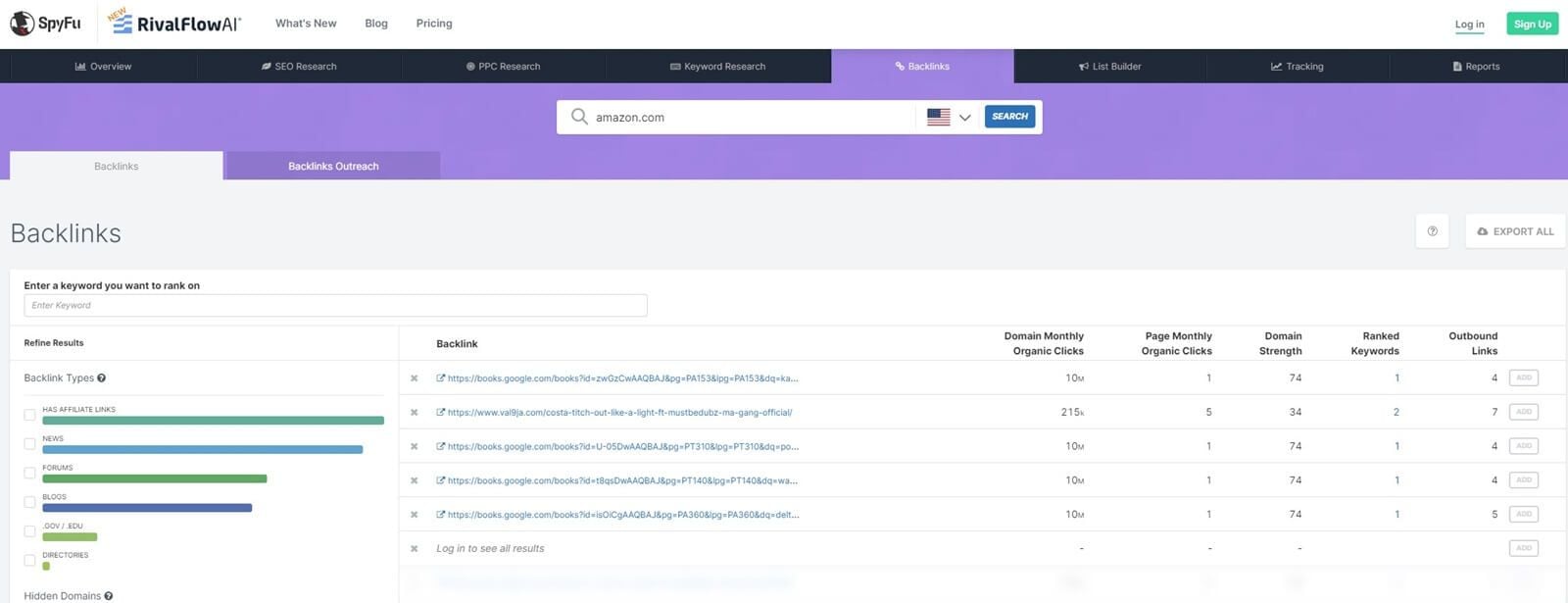
Its backlink analytics are as basic as it gets. On the left-hand side, you can see backlink types and on the right, these backlinks are displayed with their domain strength, monthly organic clicks, and a few more bits of data.
Both tools offer the Backlink Gap function and in SpyFu, it’s titled Backlink Kombat. Here, you can compare your domain with a competitor and discover the websites that link to your competitor but not you, effectively allowing you to “fill” the gap by requesting a backlink from some of these sites.
Link Building
Talking about backlinks, Semrush and SpyFu let you build a stronger backlink profile, and as expected, the first works a bit better in this regard. It will analyze your domain and display the websites that you can target for a backlink or guest post.
Better yet, Semrush enables you to contact site owners directly through email, which is a nifty addition. The entire section of this tool is basically a CRM, which makes things much simpler. SpyFu offers a feature titled Backlink Outreach.
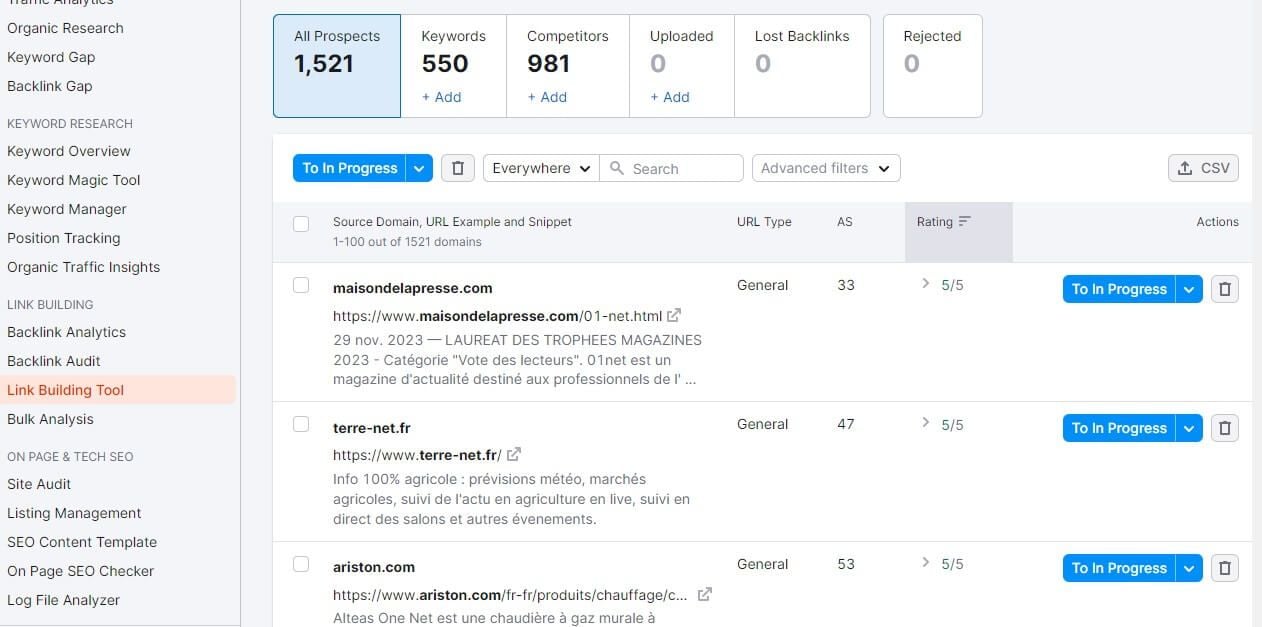
As you can guess, it’s almost nothing like Link Building in Semrush. In theory, it helps you get new backlink opportunities but in reality, you need to provide the list of the websites you want to target manually. Sounds ridiculous.
Unlike Semrush, SpyFu won’t provide you with email addresses of the targeted sites, so direct contact is much harder to realize.
Improve Your Backlink Profile With Semrush
Backlink Audit
In this SpyFu vs Semrush analysis, we liked Semrush’s Backlink Audit tool.
You will not find this tool in SpyFu, which is a major disappointment, making it an inferior Semrush alternative. The tool allows you to audit your backlink profile by giving you a toxicity score.
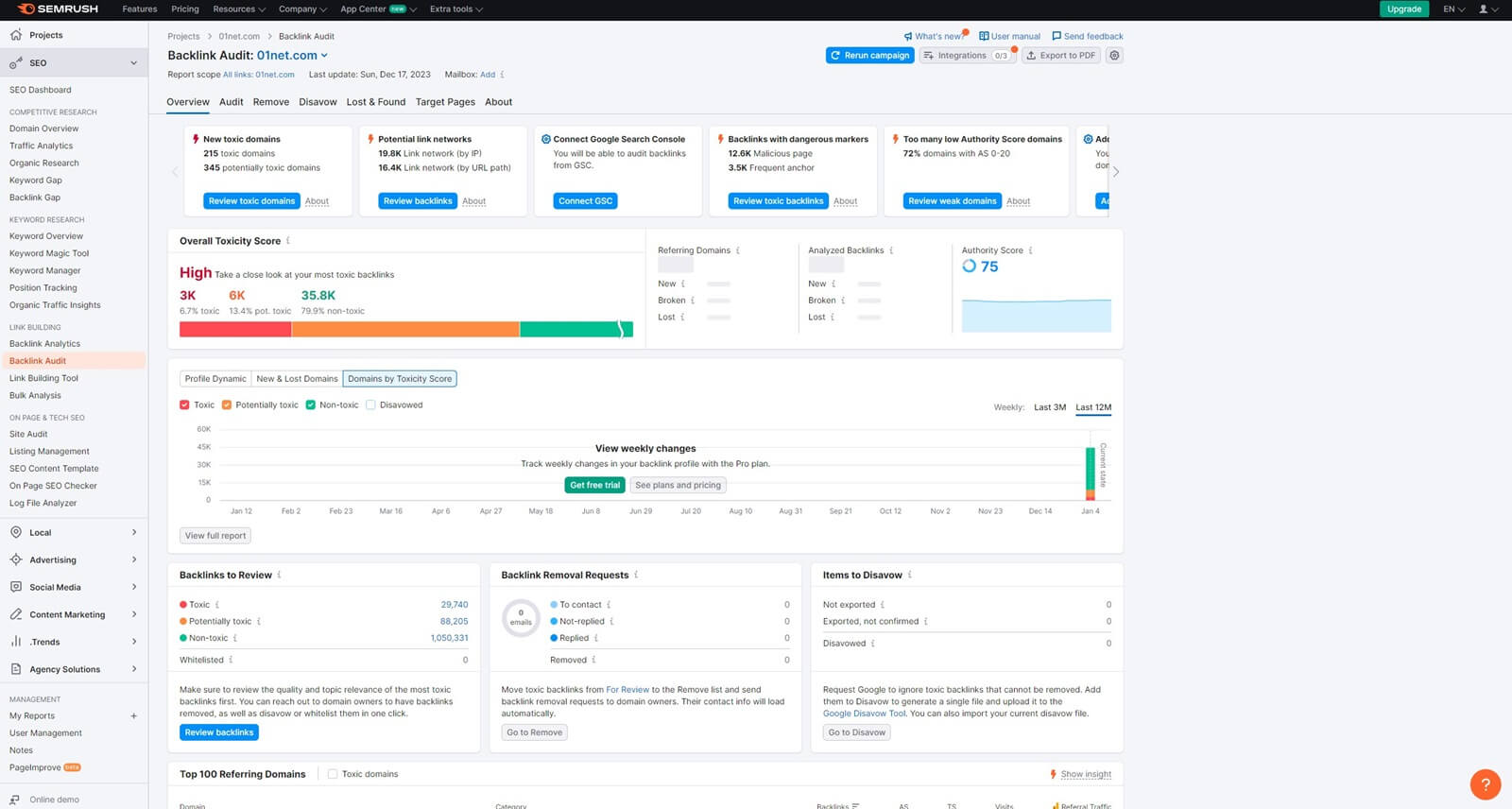
This is based on the number of toxic links that negatively impact your ranking. In addition, the tool lets you identify the links promptly and remove them in minutes. We often use the Disavow tool, which allows you to send all broken links to Google and make it ignore them.
Apart from showing you backlink-related issues, Semrush will tell you what’s good about your backlink profile. Thus, you’ll see the number of non-toxic links. Another perk is the option to use GSC (Google Search Console), which aids the auditing process.
Site Auditing (Semrush Wins)
This will be a short section of the Semrush vs SpyFu battle. Much to our dismay, SpyFu has no Site Audit tools and for us, this is a cardinal flaw. Its rival, on the other hand, works flawlessly and its Site Audit function is among the best on the market.
It’ll allow you to thoroughly evaluate your domain and its performance from an SEO standpoint. You’ll identify metrics like duplicate content, slow-loading pages, core web vitals, broken links, and so much more.
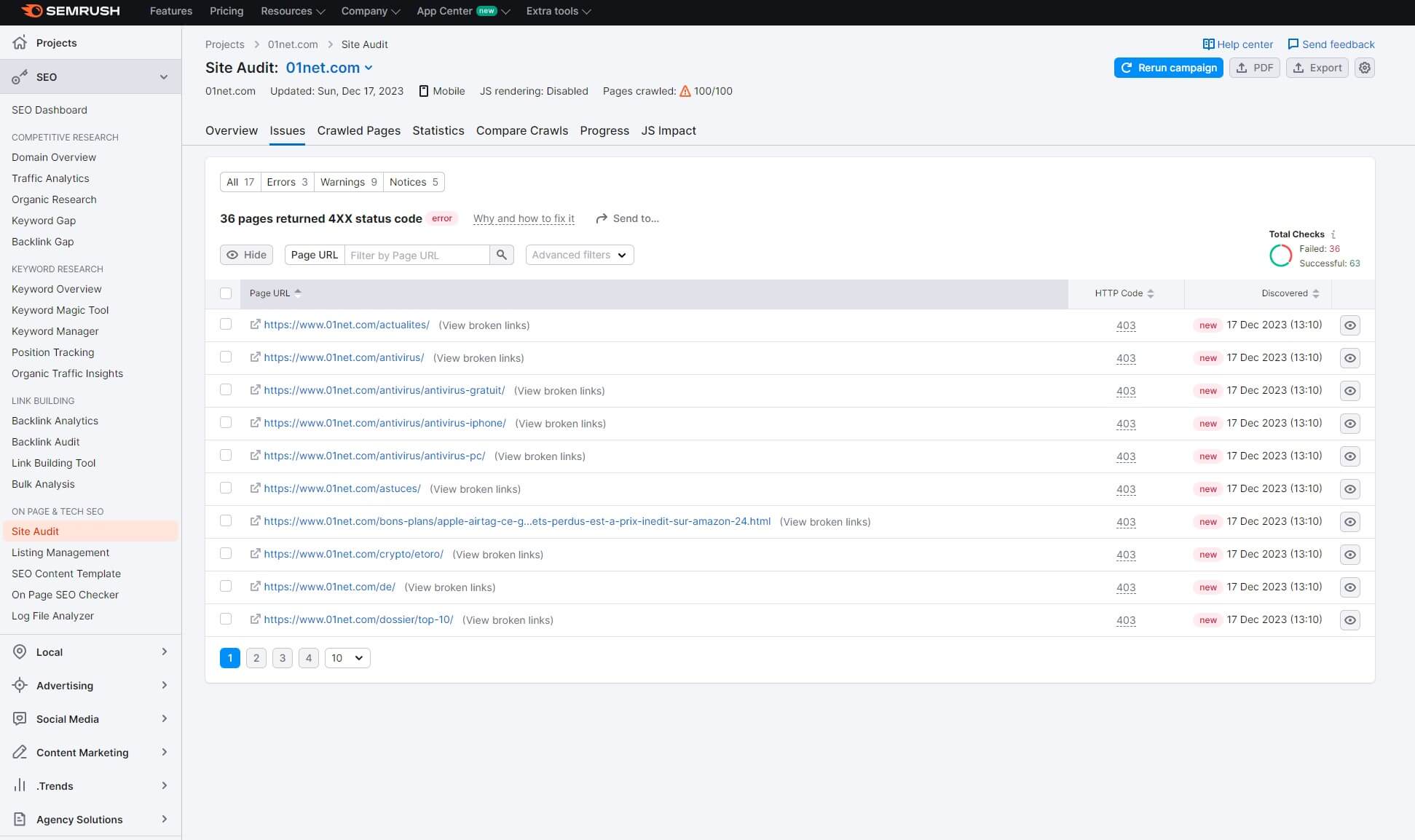
Semrush gives you a so-called Health Score from 0 to 100, indicating the level of performance the site displays. Semrush grades the on-site issues by importance, so those most severe will be marked as urgent.
Clicking on the found issue will explain it in depth and the tool will provide a fully-explained solution to it – another excellent bit. Semrush includes this On-Page SEO Checker, which checks each page of your domain individually to find errors and problems.
Its suggestions are deadly accurate and applying these solutions will inevitably lead to better SEO ranking. You don’t have to be an SEO expert to apply them, though. Everything is explained in a simple-to-grasp matter, making the process a joy.
Content Marketing (Semrush Wins)
Content Marketing is, at least for us, one of the most notable features of Semrush. It comes with benefits like the option to generate new content, get topic suggestions, and implement its writing assistant to help with content creation.
For instance, the Topic Research tool displays content ideas based on the keyword or keywords. While some ideas are non-related and meaningless, most of them make sense. Besides, each topic idea is followed by volumes, difficulty, and topic efficiency metrics.
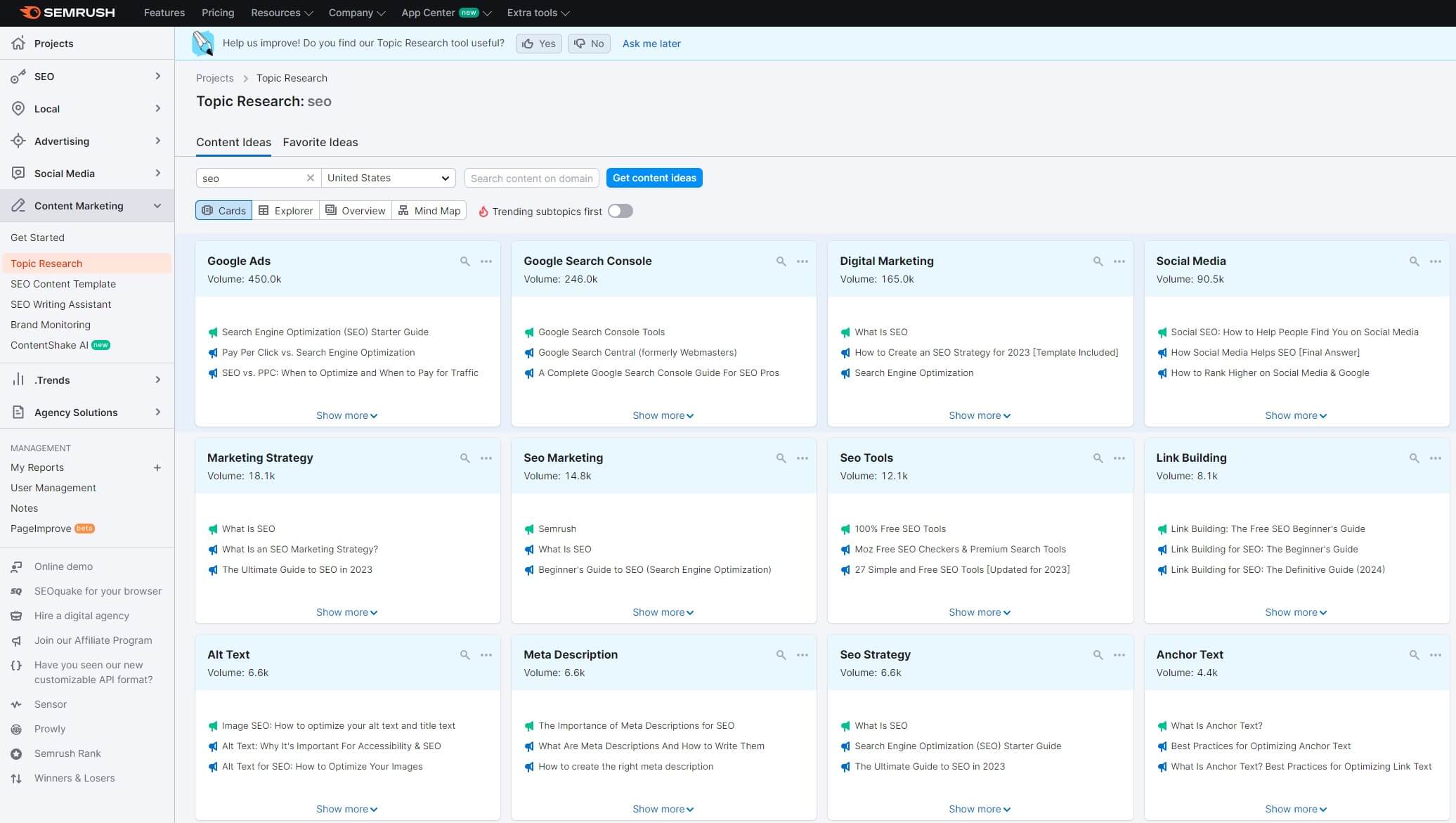
Semrush is effective at displaying topic-related questions and headlines, which we found useful. Its Content Marketing suite also contains the SEO Writing Assistant that you can use to evaluate your text and get scores for readability, voice tone, and SEO optimization.
The service offers an optional ContentShake AI to get 25 new content ideas weekly with the option to craft unlimited articles. However, it’s $60 a month, albeit, with a free trial. Content Marketing in SpyFu is nothing alike but hey, it’s not a blank spot.
SpyFu recently introduced the RivalFlow AI writing tool. It’s a neat little tool that discovers questions that your competitors answered and you didn’t, those they answered more thoroughly than you, and finally, those that you both answered.
RivalFlow AI doesn’t write content for you – sadly – but at least, it allows for content improvements. Since you know the aforementioned information, you can adjust the content accordingly and cover the preferred topic more effectively than your competitors.
However, RivalFlow AI is insolently expensive and starts at $79 per month, going up to $199 a month. For an AI that won’t WRITE stuff for you, it’s not worth the money. ContentShake AI is still a better option for us – or many other AI-based apps on the Semrush App Center.
Other Features (Semrush Wins)
Now that we touched on it, Semrush’s possibilities can be expanded through the amazing App Center. It currently offers 30+ apps, some of which are free. While most are paid, the quality they display is impeccable – akin to their somewhat expensive prices.
We like AdClarity for in-depth PPC research, as well as the AI Social Content Generator app. This app allows you to generate even videos at $35 a month. AdClarity, for example, is $169 a month, which costs more than Semrush’s Pro plan.
Free apps such as Semrush Persona and Ads Launch Assistant are handy too but they’re not very feature-rich. The good thing is that you can improve upon Semrush’s base capabilities through these handy apps for different purposes.
More expensive SpyFu’s plans include full API access. This allows you to integrate it with third-party apps, which is always welcome. Still, SpyFu doesn’t work with that many third-party apps, so limitations are more prominent in this case.
In addition to everything, Semrush includes optional add-ons like Agency Solutions, Trends, Social Media tools, and Local SEO features. This makes it a perfect all-around tool for SEO. We’ll address its free SEO functions later, as they’re spectacular.
As you can see, in this section of the SpyFu vs Semrush duel, the latter wins by a wide margin.
SpyFu vs Semrush: Ease of Use
We often prise Semrush for being intuitive and easy to get around. For beginners, it will seem imposing but that’s because of the amount of information it provides. Naturally, it must seem overwhelming at first, especially if you’re not familiar with SEO tools.
Semrush focuses on an eye-pleasing interface that incorporates colorfully-displayed data and graphs. It’s extremely easy to read and fetch information from it, as well, which is why we love using it. SpyFu, however, is easier to use.
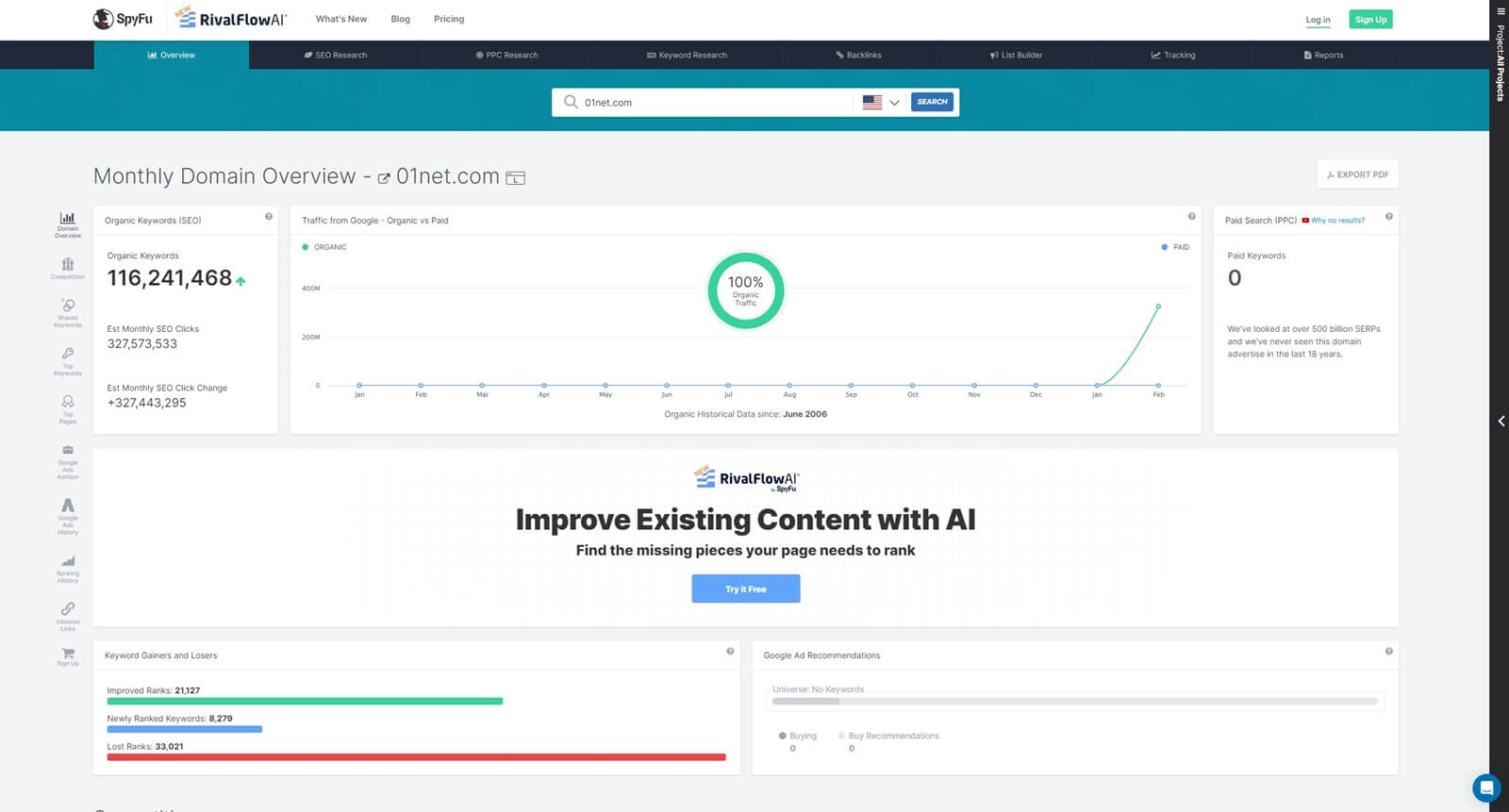
The interface looks dated, honestly, but who cares? SpyFu uses a large font with graphs sprinkled throughout for easier understanding. It looks like an “AliExpress” version of Semrush but that’s a good thing for those less experienced.
Snappiness is on Semrush’s side. It’s dramatically faster than SpyFu, as it loads data in seconds, even when analyzing larger domains. SpyFu can be slow at times, so much so that fetching data can last for 20+ seconds, rather than a few seconds in Semrush.
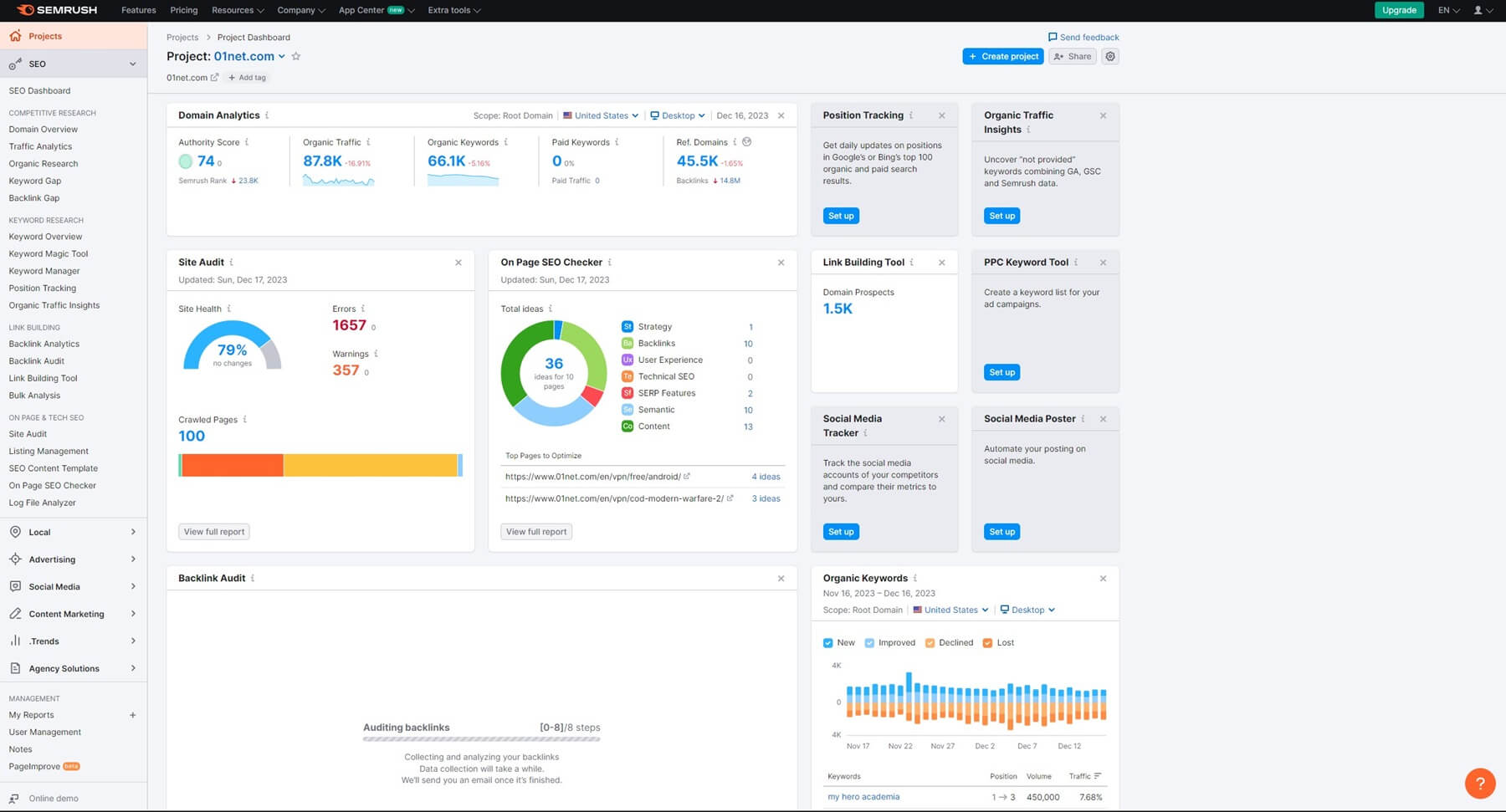
Overall, SpyFu’s interface is more intuitive but bear in mind that this is because it simultaneously displays LESS information. Semrush’s link-building tool, for example, is more intuitive, and we think its Keyword Magic Tool is impeccable in this regard.
At first glance, however, we can all agree that SpyFu seems a lot less intimidating at the cost of providing less data. Now, if you prefer a bit of a learning curve and more information, which is what we would choose, you’ll likely favor Semrush.
Semrush vs SpyFu Price Comparison
If pricing is one of your top criteria when choosing an SEO tool, you might want to read this section of our SpyFu vs Semrush comparison.
Generally speaking, many deem Semrush expensive but in reality, the tool pays itself out through vast SEO-related improvements.
Semrush
In a recent guide, we explained how to get a discount on Semrush and grab a 17% off coupon. The provider offers monthly and annual plans, whereas the latter are cheaper. At the moment, the service will cost you this much:
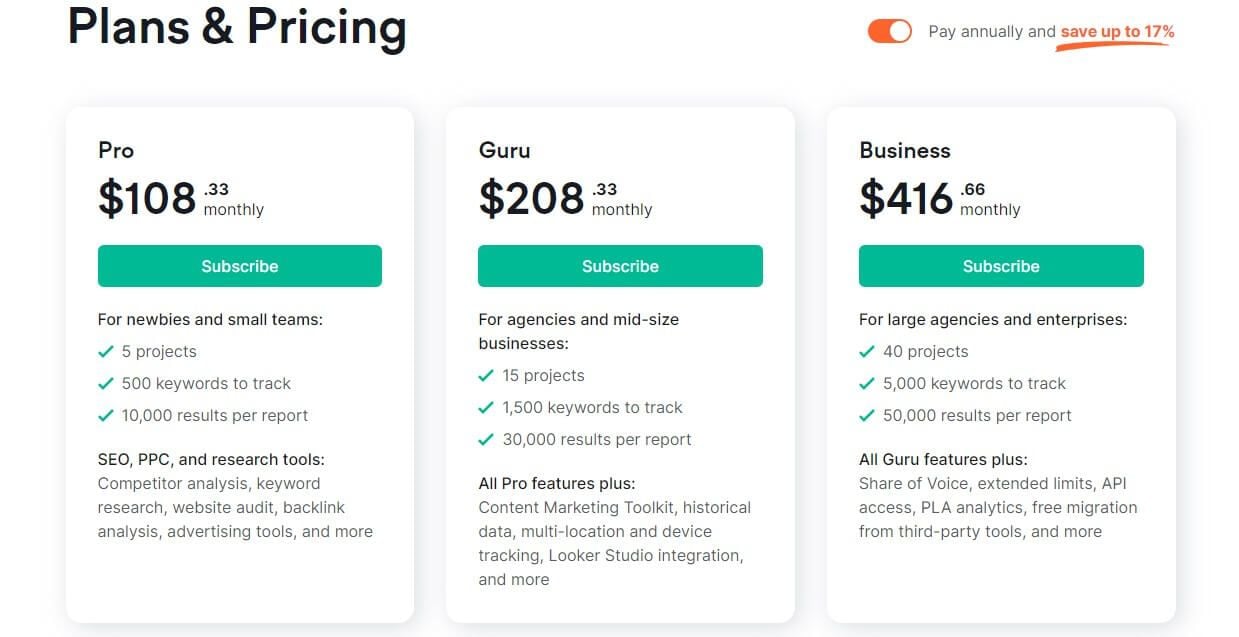
The annual plan drops the Pro plan price to roughly $108 a month. However, since it’s an annual plan, we’re talking about an upfront payment. Our favorite of the bunch is the Guru plan, which will cost around $208 a month – sounds opulent.
At this price, Semrush lets you track 1,500 keywords and obtain up to 30,000 results per report. In addition, the plan includes Content Marketing, which isn’t available in the Pro plan, yet, in this case, it can research unlimited topics.
Another thing Guru plan users get is historical data, with 5,000 keyword metrics updates per month. We don’t like that Semrush’s plans are made for a single person only. Bonus seats cost $45, $80, or $100 per month per user depending on the plan.
We also have the monthly pricing, which, as said, is 17% more expensive. If you’re planning on using it in the long run, we don’t recommend this option. Instead, opt for the annual plan and pay a cheaper price on Semrush.
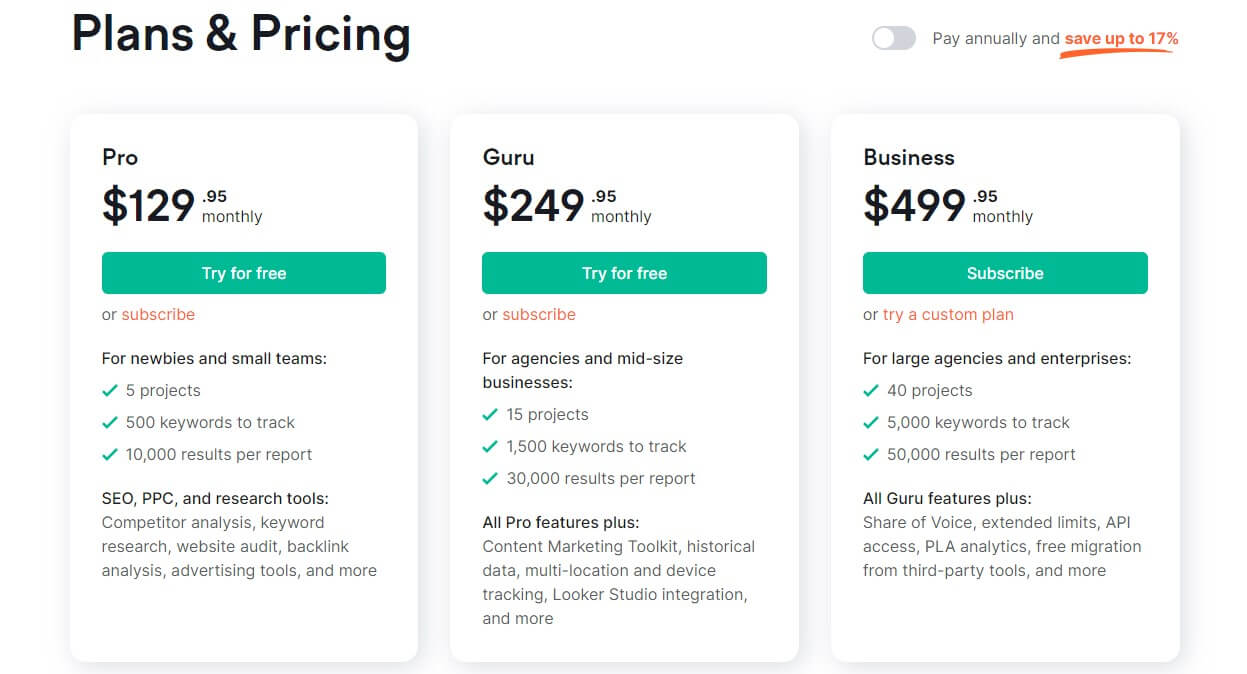
Vital to know is that there’s a free plan, plus a generous 14-day trial. By default, Semrush’s trial is 7 days but through our site, it’s 14 days – no need to thank us. Better yet, the provider’s 7-day money-back guarantee is present, ensuring a risk-free purchase.
Of course, we won’t go in-depth into the prices of its optional add-ons, as we discussed them in our review. They include ImpactHero, Agency Growth Kit, Semrush Social, and all the other apps from the App Center. Feel free to explore them at your accord.
SpyFu
SpyFu is a very affordable tool, so much so that you’ll be surprised at first. There are there plans titled Basic, Professional, and Team. The Basic plan starts at a measly $16 a month for the annual plan, while the monthly variant is $39 a month.
You can see that SpyFu emphasizes its long-term plan at least in the Basic option. We don’t recommend it, as it’s extremely limited. The Professional plan is $36 a month for the annual plan, while the monthly variant is $39 for the first month and $79 thereafter.
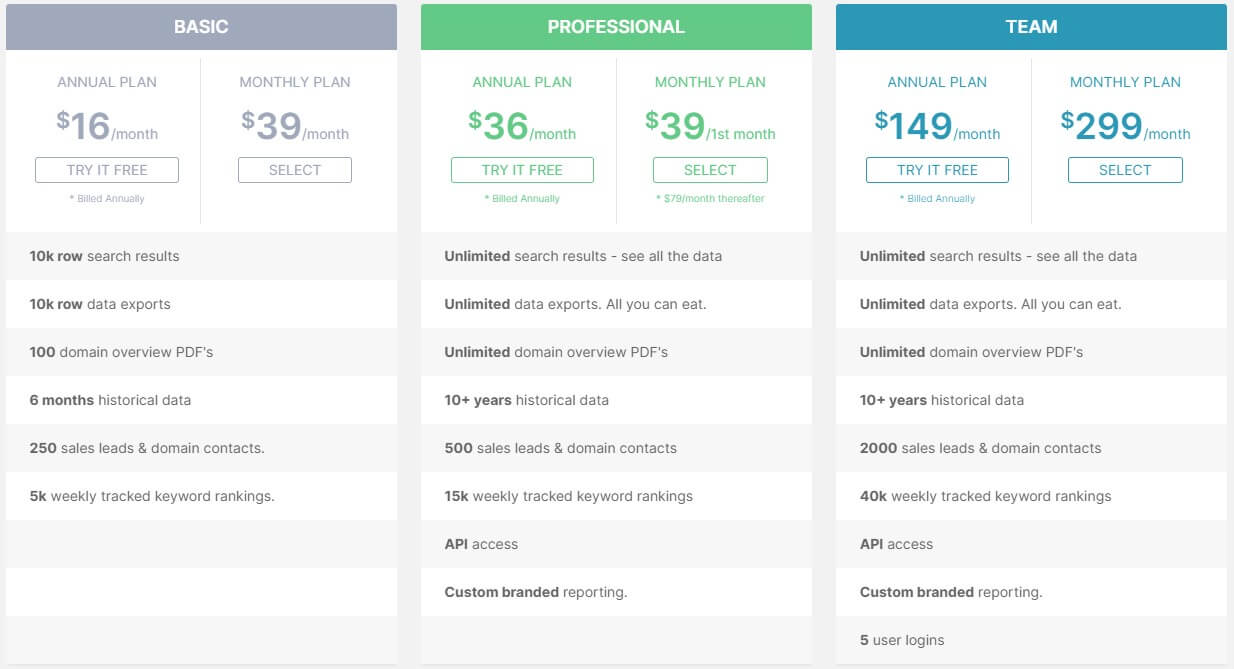
This plan is our go-to choice for unlimited data exports, domain overview PDFs, and search results. Also, the plan comes with 10+ years of historical data, full API access, and custom-branded reporting, making it great for smaller businesses.
The Team plan is very interesting at $149 a month. It offers 5 user seats and ramps everything up to unlimited, including backlink searches, keyword search results, and the number of keywords you can track. We can see that SpyFu is more user-friendly.
This is solidified by the fact that its Team plan offers 5 user logins, whereas, Semrush’s Business plan at $416 a month STILL requires you to buy additional user seats. Like its rival, SpyFu can be used for free, there’s a 7-day trial and offers a 30-day refund policy.
No doubt, budget-limited users likely won’t think twice between SpyFu or Semrush. Again, the first service is way cheaper but as shown in this guide, offers way less.
Which One Is a Better Free SEO Tool?
In this Semrush vs SpyFu comparison, we should promptly address their free versions. Namely, both providers can be used for free but we like that SpyFu requires no login for that. Simply visit its site, enter the domain address, and get the information you need.
Semrush requires an account but at least, it’s easy to make in a minute. We prefer Semrush as a free tool because it’s more feature-rich. The free experience is similar to the Pro/Guru/Professional experience but serves as more of a “Lite” version.
This means you can access domain/keyword research, site audits, and even Content Marketing. However, you’re limited to the number of keywords and domains you can include. For instance, you can audit only one website as opposed to 5 or more.
SpyFu follows the same principle, which we like. However, despite being slightly more hassle-free, as it lacks mandatory registration, SpyFu is still less feature-rich. Therefore, Semrush is a winner of this round.
Customer Support
When talking about customer support, there’s not much to report. It’s redundant whether you choose Semrush or SpyFu in this regard. Both tools offer support via:
- Live Chat
- Phone
This means it’s easy to get in touch and ask for help. On both sites, you’ll find a live chat widget, which can be used for direct contact. Another option is to log in to your account and call any of the services directly, which can be less viable because of potentially longer waiting times that can tarnish the experience.
If you’re not in a rush, email support is probably the best option. Send a support ticket and your issue will be tackled in a few hours. Indeed, there’s very little to complain about here, so let’s leave it at that.
The Final Verdict: Semrush Wins Against SpyFu
According to our comprehensive SpyFu vs Semrush duel for 2024, the latter emerges victorious.
We’ve been using both services for years now, so we’re pretty experienced with both. Semrush is a superior SE Ranking alternative and even beats Ahrefs and Moz – two of its main rivals.
SpyFu is inferior to all four, which tells us one thing – it’s not better than Semrush. We recommend SpyFu if you’re on a budget and want to squeeze as much juice as possible from a cheap SEO tool. Rest assured, SpyFu will serve you well.
It’s filled to the brim with intricate information, PPC analytics, and backlink research but not as much as Semrush. This service is on another level. It digs out bits of information many of its rivals can’t, such as search intent and accurate traffic estimates.
Moreover, its possibilities are expanded through the App Center, which can make Semrush an even better all-around tool. Granted, you’ll have to pay way more for it but nothing great ever comes cheap.